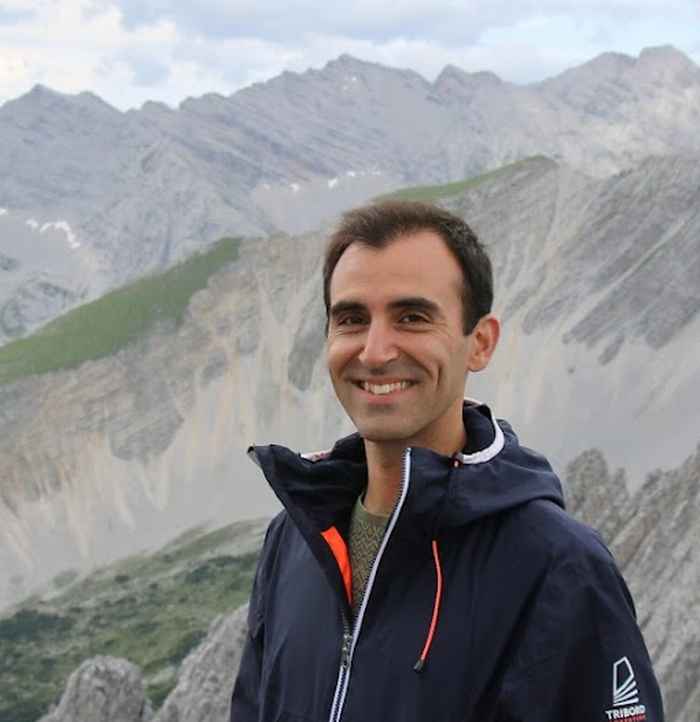Combating polarisation with computer models
31 October 2024
Climate change, the nitrogen problem, the covid crisis - these are recent examples of major problems where the Dutch have strong differences of opinion about the possible solutions. Research shows that polarisation in society, which causes groups of people to become separated, has increased in recent years. Vítor Vasconcelos, assistant professor at the UvA's Computational Science Lab (CSL) studies polarisation from a complex systems perspective. Both the climate as well as the interactions between people can be considered as systems.

Fishpond
He studied physics in Lisbon and has always been interested in systems thinking and game theory. His studies were followed by two postdoctoral studies at Princeton University in the United States, where he initially focused on ecological systems. ‘For example, a classic problem in ecology is the interaction between fish and algae in a pond. Fish eat algae and get oxygen produced by other plants. This keeps the number of algae low and gives other plants enough daylight to produce oxygen. But when fertilisers are released in the pond, the algae population grows too fast, more than the fish need. Thus, the pond becomes covered with algae and the fish die. Feedback mechanisms arise between different elements that at some point reach a tipping point. You can find these kinds of mechanisms everywhere in nature.’ Vasconcelos is trying to map these mechanisms so that tipping points become more predictable. As a result, interventions can be made in time.
Experiment
However, Vasconcelos has moved away from the ecological world somewhat, and now focuses on social systems. Polarisation is an important theme here, because if people are more withdrawn into their own bubble, it becomes more difficult to make decisions that are beneficial to society as a whole. Vasconcelos demonstrated this along with behavioural economists, among others, in an experiment in which 750 people had to deliberate in groups how to make the most money. People could choose between a risky and a safe option. In the risky option, they all could make more money, but then many others had to choose that option too. In the safe option, they got a lower amount, which did not depend on others' choices. If people also gained insight into the gains made by the others, all groups made the most money, especially the groups with diverse winnings. If people did not have that insight, or if the groups were too similar, then significantly less was earned.

Coordination dilemma
‘It's a metaphor for tackling climate change, for example. You have to work with others to make a collectively optimal choice, and that requires an investment. You need to mobilise others, because only then will you get that optimal outcome. You can apply this to buying solar panels, for example. Countries and individuals need others who also invest to improve the technology and get the prices of solar panels down, such that you reach a threshold where the savings on the energy bill wins out over the purchase cost.’ According to Vasconcelos, this coordination dilemma, as it is called, can be solved by making more connections between different groups. ‘Groups that do not agree can thus learn from the groups that did reach consensus on the best outcome.’
Integrating qualitative and quantitative methods
Vasconcelos' work is to build computer models of such situations, and validate them through controlled experiments or real-world observations. Are our theoretical assumptions about how social coordination works correct, or are adjustments needed? This could make the model more widely applicable and lead to recommendations for policy interventions. In the case of this coordination study, it was a fairly simple, stylised experiment, but Vasconcelos is now working on studies that are a lot more complex. For instance, he plans to investigate the impact of polarisation on covid policy in education and health care, by bringing together groups of experts, and asking them what factors they think contribute to polarisation on this topic. ‘It will be a great challenge to integrate this qualitative method into a quantitative model to test new interventions.’
By teaching young people systems thinking, we plant a seed that can lead to better decisions to tackle future challenges.Vítor Vasconcelos
New master
Bridging quantitative methods to real-world interventions is what Vasconcelos is most excited about. He is therefore chairing the development of a new master's programme at the UvA called Complex Systems and Policy, which he hopes to launch in 2025. It will be a transdisciplinary programme, combining different fields of science, namely computer science, psychology, economics and law. In addition, case studies will be brought in by a variety of organisations such as municipalities and independent governmental agencies. Participatory techniques, such as expert interviews, will be combined with building computer models, as well as knowledge about legislation. ‘By teaching young people systems thinking, we plant a seed that can lead to better decisions to tackle future challenges.’
Research information
Link to the article: Segregation and clustering of preferences erode socially beneficial coordination.
Computational Science Lab (CSL) website.